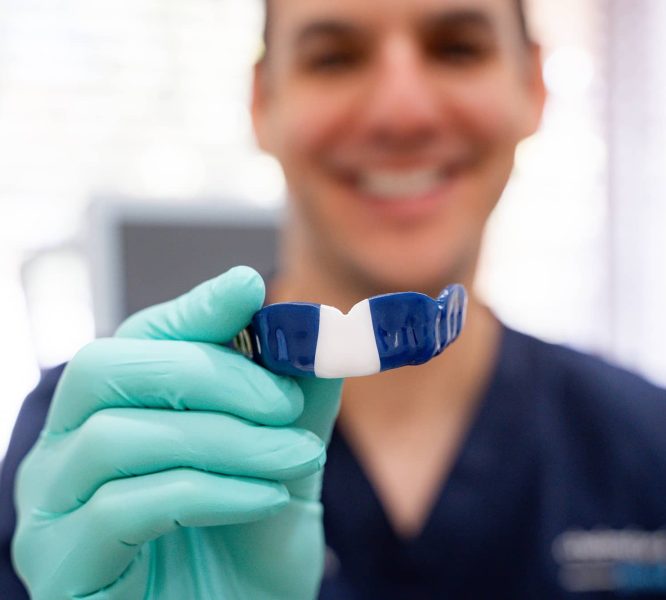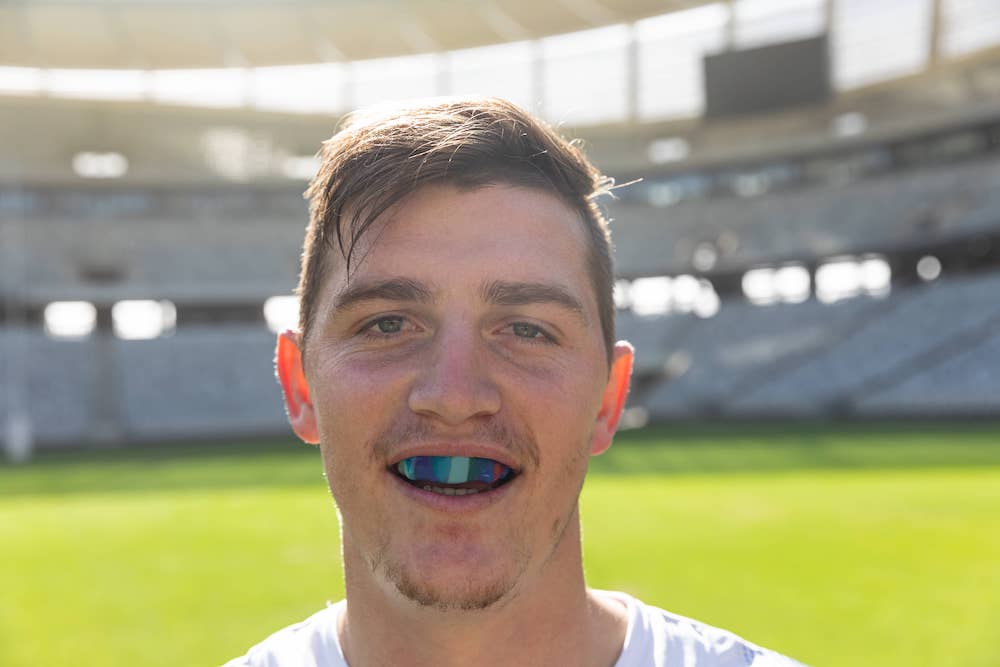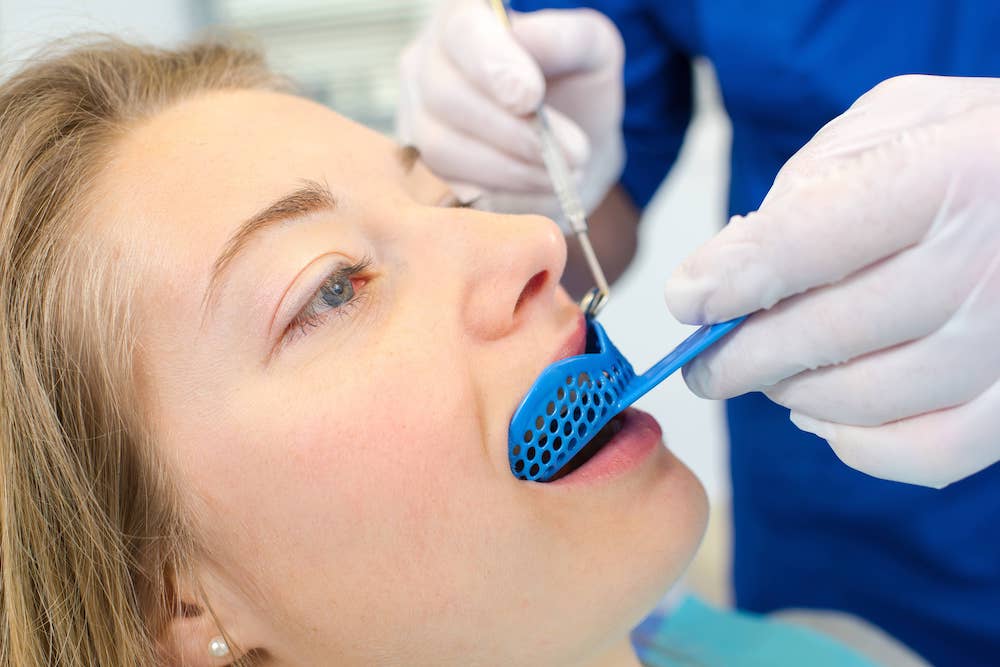Accidents happen, which is why we are strong supporters of protecting your mouth and teeth with custom-made mouthguards.
Custom-made mouthguards are designed to fit your mouth and protect your gums and teeth from injury during certain activities or sports. A mouthguard acts as a barrier to lessen the impact from elbows, knees, balls, or anything else that makes contact with your jaw or teeth during physical sports.

As opposed to ready-made, one-size-fits-all type mouthguards sold over the counter, custom-made mouthguards are professionally made to fit the exact shape of your mouth. Off-the-shelf, ready-made commercial mouthguards do not provide the same level of protection and are not as retentive or comfortable.

We recommend wearing a mouthguard for activities such as:

Our staff are more than happy to answer any questions or queries you may have.
According to SleepEducation.org, about 40 per cent of men and 24 per cent of women snore habitually. Snoring happens when the upper airway’s soft tissue vibrates. It can be due to a lot of reasons. The most common are having too much nasal tissue and the position of the tongue while sleeping. Snoring is one of the signs of Obstructive Sleep Apnoea (OSA).
Also known as oral vestibular plates or mouth shields, a snoring mouth guard is a special type of mouthpiece that stops you from breathing through your mouth. Therefore, it effectively prevents the mouth and throat tissue from vibrating.
A snoring mouth guard is shaped like a boxer’s mouthpiece, but it is not as bulky. The slim design allows you to sleep comfortably at night. It is large enough, so you never have to worry about accidentally swallowing it or choking in your sleep.
Snoring mouth guards are inserted into the mouth, touching the teeth, although not anchored firmly. This mouthpiece is not only useful for stopping mouth breathing at night. It also prevents the unpleasant consequences of snoring and mouth breathing, including bad breath (halitosis), caries, and dry mucous membranes.
A snoring mouth guard will help you sleep better through natural nasal breathing. This way, your body will regenerate faster and more efficiently.
Teeth grinding while sleeping is a condition recognised as bruxism. You tend to grind and clench your teeth, which can later cause tooth and jaw pain and sore gums. If ignored, this condition can eventually damage the teeth.
People with bruxism usually do not know they grind their teeth. It is quite common among Australians and can even go hand-in-hand with another condition called temporomandibular joint disorder (TMJ).
Wearing a mouth guard for bruxism can help retain the position of the upper and bottom rows of the teeth. They are kept separate, so there is no damaging pressure even when you clench your teeth. Some of the signs that you need a mouthguard include chipped teeth and waking up with a headache.
There are a few types of mouthpieces for teeth grinding, such as stock mouth guards, which are a one-size-fits-all solution. They are made from plastic or rubber. The ideal option, however, is a custom-fitted one, such as a bite splint. It is more comfortable and easier to keep in place even if you keep tossing and turning while you sleep.
Because they are custom-fitted, bite splints fit better. They are typically worn at night, but dentists may tell you to wear them during the daytime if your bruxism is severe.
Mouthguards are essential for kids to help them avoid any dental emergencies. These dental appliances are useful for those who participate in sports. When worn, they cushion blows to the face, which minimises the risk of damaging teeth and other injuries on the face, lips, or jaw.
Wearing mouthpieces is great for kids who enjoy contact sports, such as football, boxing, basketball, and ice hockey. If your child likes non-contact activities, including gymnastics, skateboarding, and mountain biking, it is time to get a protective mouthpiece.
Mouthguards for kids are not just for those who are active, but also for children who have sleep apnoea. In many cases, this sleep disorder is temporary, and there is nothing to worry about. However, parents have to watch out for significant signs, including snoring, breathing pauses, and other breathing problems when sleeping.
If your child is often sleepy during the daytime and shows behavioural issues, they are indicators of obstructive sleep apnoea.
A mouth guard has plenty of advantages when worn, whether for contact or non-contact sports or sleep disorders, such as snoring and teeth grinding. Protect your child’s teeth with the right mouthpiece, which can prevent tooth chipping and damage – or even tooth loss.
An orthodontic mouthguard should be chosen with special care. Brace-wearers have unique requirements, particularly athletes. These dental appliances are specifically designed to ensure they conform to the brace brackets. Therefore, discomfort is prevented, as well as the risk of mouth lacerations.
Finding the best mouthguard that fits your braces and mouth does not have to be a challenge. You only have to talk to your dentist or orthodontist to ensure that the mouth guard will not interfere with the brace brackets. Strapped versions are available, which are useful for those who are active in sports. Meanwhile, strapless versions are best for most people.
The pop in and play mouth guards are easy to use. Depending on the material, you typically just have to place them in your mouth. There is no need to boil and fit the appliance.
Some mouth guards are intended for people who have upper braces. Take note of this restriction if you wear braces on your lower teeth.
The beauty of the mouthpiece for brace wearers is that it adapts to the changes in the teeth’s positioning. If you wear Invisalign, you may want to talk to your orthodontist first before you use mouth guards.
Custom-made mouthguards are designed to fit the unique shape of your mouth and be completely painless to wear. There may be some initial discomfort as you adjust to your mouthguard; it will then be extremely comfortable to wear.
Custom-made mouthguards are proven to be a very effective method for protecting the mouth and teeth and minimising injury while playing contact sports.
Please contact us today if you have any questions or would like to set up a consultation to see if a custom-made mouthguard is a good option for you.
The lifespan of custom mouthguards varies based on factors like frequency of use, teeth grinding intensity or contact during sporting games. On average, custom mouthguards can last anywhere from one to five years. Regularly inspect the mouthguard for signs of wear and tear, and replace it if it becomes damaged to ensure continued protection.
If your mouthguard doesn’t fit properly, it may not provide adequate protection. In such cases:
Proper cleaning is crucial to maintain hygiene. Follow these steps:
Mouthguards serve various purposes, including: